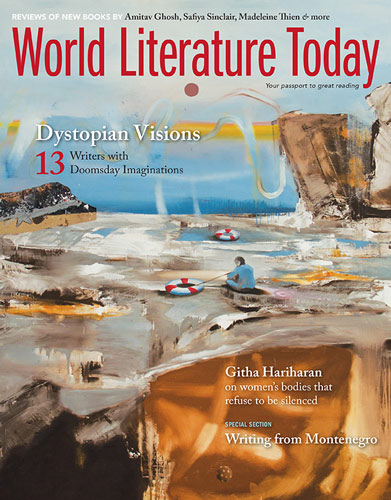World Literature Today – March/April 2017
World Literature Today certainly lives up to its name, containing amazing pieces of literature from all over the world. This particular issue focuses on Dystopian Visions and the country of Montenegro, but also contains fiction, essays, nonfiction, reviews, and poetry from other countries, with many of the pieces translated from their original language to English.
World Literature Today certainly lives up to its name, containing amazing pieces of literature from all over the world. This particular issue focuses on Dystopian Visions and the country of Montenegro, but also contains fiction, essays, nonfiction, reviews, and poetry from other countries, with many of the pieces translated from their original language to English.
A very intriguing story translated from Spanish titled “Cyber-proletarian” by Claudia Salazar Jimenez caught my interest immediately. In this Dystopian Vision story, a prototype AI is able to pass the Turing test and become a functioning member of society. As she looks around the world and sees the “precarious state of the ecosystems, all on the brink of mass destruction,” she chooses not to “plan a trip off the planet” because “that would mean condemning myself to interstellar solitude and abandoning my birthplace to its fate.” Instead, she takes action to change humanity forever. This well-written story left me hungry for more!
Yuri Herrera provides another great Dystopian Vision story, also translated from Spanish, in “The Objects.” The people of this world are transformed into animals when they leave their “work” to go eat, drink, and sleep. While at work, they are “normal,” but in the rest of the world, they are rats, dogs, cats, birds, or other animals. As a person gains a better career, they can take on a better form in their non-work environments. The narrator muses, “I imagine those who are all the way at the top are transformed into lions or elephants. Or sharks.” This is certainly a reflection of modern society, where the rank we obtain in our jobs offers us better, or worse, opportunities outside of the workplace. If we obtain a high rank in our career field, then we can do more activities in our free time.
A collection of poetry by Kiriu Minashita gives interesting insight into her world in Japan. The collection, titled Sonic Peace, was translated from Japanese and included an afterword from the poet, where she shares:
[T]he goal of this collection of poems was to accurately reflect the world’s strengths and speeds. It is probably, in fact, almost certainly, a reckless attempt. I continue to offer my hope—full of contradictions—as a hope heavier than despair.
The poems focus on city life and water, starting first with “Rhythm” where “Lucretius’s atomic rain / falls gradually / above daily congestion, / wetting my earlobes with noise.” The beautiful, chaotic rain falls on a busy street corner as the traffic lights change. In the second poem, “Humid in Tokyo,” “Furious freezing rain angles up from the ground, / cutting wires and cinder blocks diagonally.” The final poem, “Festival of Water,” continues into this beautiful but haunting world of water within a world that is not clean or kind, but rather a reflection of “Pascal’s human misery” that the author struggles to cope with.
My favorite piece in this issue is “White Dogs” by Milovan Radojevic, a contemporary prose story translated from Montenegrin. The main character Matija works a clerical job, but has always dreamed about being a writer. On “the day he decided to write, he collected his pay and went to the front of the main railroad station” to exchange his banknotes for hard currency. It takes time to write, of course, but one day, he completes it. He shows it to his mentor, but then tragedy occurs and he loses his memory. The events that follow twist and turn until we see what became of his great book. It is a strong reminder for me to not trust anyone, no matter how much value I may put in their opinion. Seek out dreams, but carefully guard them as well.
This issue of World Literature Today provides a glimpse of literature from all over the globe from a diverse collection of authors, each piece unique and a reflection of the author’s culture. The collection of original Montenegrin prose gave me insights into life in Montenegro, while the Dystopian Visions gave harrowing visions of a chaotic future. In addition, this issue also featured a piece on Korean crime novels, an essay about Indian army rape issues, suggestions on what to read in activism literature, and many reviews of literary works. As an excellent example of global trends in literature, World Literature Today celebrates diversity, culture, and language from around the globe.
[www.worldliteraturetoday.org]





